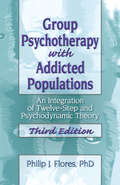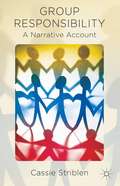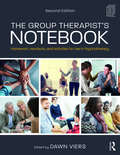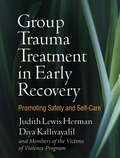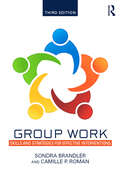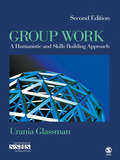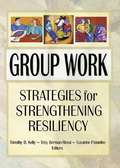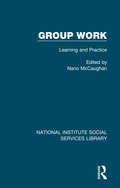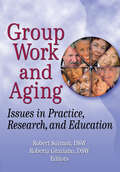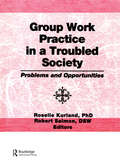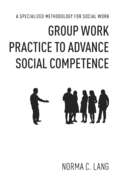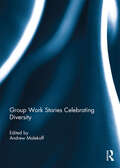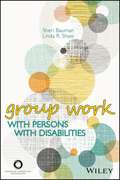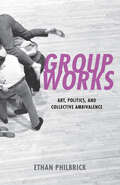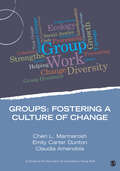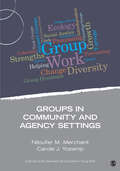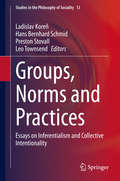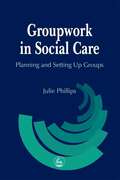- Table View
- List View
Group Psychotherapy with Addicted Populations: An Integration of Twelve-Step and Psychodynamic Theory (Third Edition)
by Phillip J FloresBe more effective in group therapy with addicted clients Group Psychotherapy with Addicted Populations: An Integration of Twelve-Step and Psychodynamic Theory, Third Edition is the newly revised edition of the classic text, that provides you with proven strategies for defeating alcohol and drug addiction through group psychotherapy. Philip J. Flores, a highly regarded expert in the treatment of alcoholism and in group psychotherapy brings together practical applications of 12-step programs and psychodynamic groups. This updated book explores the latest in constructive benefits of group therapy to chemically dependent individuals, providing opportunities to share and identify with others who are going through similar problems, to understand their own attitudes about addiction by confronting similar attitudes in others, and to learn to communicate their needs and feelings more directly. Topics in Group Psychotherapy with Addicted Populations: An Integration of Twelve-Step and Psychodynamic Theory, Third Edition include: alcoholism, addiction, and psychodynamic theories of addiction alcoholics anonymous and group psychotherapy use of confrontational techniques in the group inpatient group psychotherapy characteristics of the leader transference in the group resistance in groups preparing the chemically dependent person for group the curative process in group therapy integrating a modern analytic approach a discussion of object relations theory group psychotherapy, AA, and twelve-step programs diagnosis and addiction treatment treatment issues at early, middle, and late stages of treatment a discussion of guidelines and priorities for group leaders countertransference special considerations of resistance to addiction termination of treatment Professionals working in group therapy and addictions will find Group Psychotherapy with Addicted Populations: An Integration of Twelve-Step and Psychodynamic Theory, Third Edition an invaluable resource emphasizing the positive and constructive opportunities group psychotherapy brings to the chemically dependent individual.
Group Responsibility
by Cassie StriblenDrawing on work in social psychology, narrative ethics, and feminist philosophy, the author presents a new account which answers the standard objections while also giving practical guidance to individuals who take their group-related responsibilities seriously.
The Group Therapist's Notebook: Homework, Handouts, and Activities for Use in Psychotherapy
by Dawn ViersFollowing in the footsteps of the successful first edition, The Group Therapist’s Notebook, Second Edition offers an all new collection of innovative ideas and proven interventions that will enhance any group therapy practice. Seasoned and up-and-coming experts provide field-tested activities, easy to reproduce handouts, and practical homework assignments for a variety of problems and population types. Each chapter is solidly grounded with a theoretical foundation and includes materials to gather for implementing the intervention, detailed instructions for use, suggestions for follow-up in successive meetings, contraindications for use, and resources for the client and therapist. With an added emphasis on instruction, real-world examples, and extension activities, this new resource will be a valuable asset for both beginning and established mental health practitioners, including counselor educators, social workers, marriage and family therapists, guidance counselors, prevention educators, peer support specialists, and other group facilitators.
Group Trauma Treatment in Early Recovery: Promoting Safety and Self-Care
by Judith Lewis Herman Diya Kallivayalil and Members of the Victims of Violence ProgramInfused with clinical wisdom, this book describes a supportive group treatment approach for survivors just beginning to come to terms with the impact of interpersonal trauma. Focusing on establishing safety, stability, and self-care, the Trauma Information Group (TIG) is a Stage 1 approach within Judith Herman's influential stage model of treatment. Vivid sample transcripts illustrate ways to help group participants deepen their understanding of trauma, build new coping skills, and develop increased compassion for themselves and for one another. In a large-size format for easy photocopying, the volume provides everything needed to implement the TIG, including session-by-session guidelines and extensive reproducible handouts and worksheets. Purchasers get access to a companion website where they can download and print the reproducible materials from the book, as well as an online-only set of handouts and worksheets in Spanish. See also The Trauma Recovery Group, by Michaela Mendelsohn, Judith Lewis Herman, et al., which presents a Stage 2 treatment approach for clients who are ready to work on processing and integrating traumatic memories.
Group Treatment for Substance Abuse
by Gaylyn Maurer Mary VelasquezThis practical manual presents a 29-session treatment program designed to engage, motivate, and stimulate processes of change in clients at all stages of recovery. The program is based on the research-supported transtheoretical model of behavior change. The manual describes skills-building activities and interventions that are likely to be most effective with clients as they cycle from the earlier stages of change precontemplation, contemplation, and preparation to the later stages, action and maintenance. Each of the structured sessions is presented in a consistent, highly accessible format, including a clear rationale, summary of objectives, and overview of the main activities that will take place. Step-by-step guidelines for implementation are provided, as well as strategies for using a motivational interviewing style. The manual is complete with all needed handouts and exercise forms, ready to photocopy and distribute to clients. Ideal for use with groups, the approach can easily be adapted to individual treatment.
Group Work: Skills and Strategies for Effective Interventions
by Sondra Brandler Camille P. RomanThe new edition of Group Work adds a focus on diversity and the use of self in group work, an area too often neglected in professional training but essential to meeting current competence standards set by the Council on Social Work Education. As in previous editions, students and professors will find thoughtful analyses of complicated value dilemmas and specific techniques for use in a diverse range of settings, including confrontations and situations where humor is appropriate. Complete with more games and exercises, an updated discussion of values and ethics, and an expanded skills section, Group Work also contains excerpts and discussions of case studies that can be applied to students’ own experiences and will serve as a valuable references for years to come.
Group Work: A Humanistic and Skills Building Approach (2nd Edition) (Sage Sourcebooks for the Human Services Series)
by Urania E. GlassmanA book that supports the human spirit and the humanistic visions of those who champion personal and social change through the social work group….The Second Edition of Group Work: A Humanistic and Skills Building Approach identifies the humanistic values and democratic norms that guide the group practitioner's interventions. The book presents seven stage themes of group development, 29 techniques for group work practice, and more than 60 new illustrations from contemporary group work. The Second Edition remains centered on the role of the social group work practitioner, who employs group work methods to further the personal growth and empowerment of members in community and institutional contexts.Features of the Second Edition:· Offers 29 new descriptions of group work practice techniques, which have applicability in clinical, support, and organizational groups· Provides seven stage themes of group development, describing member reactions and highlighting worker pitfalls, self-awareness issues, and skills for maximizing member growth within each stage · Presents 60 new illustrations of group meetings, which demonstrate the practitioner role and conclude with discussion and analysis· Includes an updated Chapter 10, which highlights ethical values in mental health, substance abuse treatment, and health care groupsIntended AudienceThis is an ideal core text for advance undergraduate and graduate courses such as Group Work, Foundation Practice, Skills of Counseling, and Group Dynamics in the fields of social work, psychology, and counseling.
Group Work: Strategies for Strengthening Resiliency
by Timothy B. Kelly Toby Berman-Rossi Susanne PalomboExplore the latest research and practice information in group work!Group Work: Strategies for Strengthening Resiliency is a collection of research and information presented at the Twentieth Annual International Symposium on Social Work with Groups. Resiliency issues are explored in relation to children, couples, managers, survivors of torture, poor women, HIV/AIDS affected youth, and other population groups. The contributors were keynote speakers and paper presenters at the symposium. They represent a wide range of fields of practice and experience.For social workers, students, educators, and practitioners, this volume examines how group work can improve resiliency in your community. Here's a sample of what you'll find inside: Keynote Speaker Jeremy Woodcock's experiences in his groundbreaking resiliency work with victims of torture Alex Gitterman's brilliant exposition of the notions of resiliency and vulnerability--he outlines the current thinking and puts it into a group work context case examples that illustrate resiliency in children a discussion of how residential settings can function like a 24-hour group and how to use that group effectively to strengthen the resiliency of the residents a way to use groups to help develop social and economic capital for poor women through investment clubs group themes and practice strategies for group work with couples who have differing HIV statusGroup Work: Strategies for Strengthening Resiliency also contains chapters reflecting the personal experiences of the authors. One shares her transformation from a worker who did case work in a group into a social group worker. Another shares a reminiscence of a personal journey during her formative years as a budding group worker.From its description of how the use of group work principles and skills can benefit managers and programs to its challenge to group workers to incorporate some community work skills into their repertoire, Group Work: Strategies for Strengthening Resiliency is more than a fascinating read--it is a tool to help you keep abreast of the latest theory and practice in this ever-changing field.
Group Work: Learning and Practice (National Institute Social Services Library)
by Nano McCaughanGroup work is central to social work, whether it be work with individuals and families, residential care, community work, management or social work education. Despite, however, the upsurge of interest in this aspect of social work method at the time Group Work: Learning and Practice, originally published in 1978, represented the first attempt at providing an up-to-date and carefully integrated source book for students – in the form of a series of mainly original and British papers on social group work: its knowledge base; the possible varieties of practice settings and objectives; and its implications for social work education and training models. For new directions in social work education suggested that the small group was to become the core system around which much future social work teaching would be based. The main concern of this new National Institute for Social Work reader – the development and demonstration of intervention skills in practice – would be particularly relevant. The book draws attention to the opportunities for work with groups in the community, in residential institutions and with families, where the emphasis was rapidly shifting towards the need for greater understanding and use of the small group dimension. Group Work: Learning and Practice would have been widely welcomed both by specialists in group work at the time and all those more generally interested in social work methods – as teachers, students, practitioners, supervisors and as local authority training officers. It would also be of interest to a wider readership of teachers, youth workers and those concerned with the group dynamics and counselling fields.
Group Work and Aging: Issues in Practice, Research, and Education
by Robert Salmon Roberta K GrazianoGet a wealth of information about the theory and practice of social work with older adults, their families, and their caregivers!Although there is a considerable amount of writing on both group work and social work with the elderly, there is surprisingly little about applying this practice method to this specific age group. Group Work and Aging: Issues in Practice, Research, and Education fills this gap by presenting penetrating articles about a mutual aid approach to working with diverse groups of older adults with varied needs. Respected experts and gifted researchers provide case studies, practice examples, and explanation of theory to illustrate this practice method with aging adults, their families, and their caregivers.Group Work and Aging: Issues in Practice, Research, and Education discusses in-depth information on group work with gay and lesbian elders, caregivers, elders with Alzheimer&’s disease, service providers, special populations such as Vietnamese and Latino/a elders, and provides information on the use of expressive therapies like art, drama, and dance. Each well-referenced chapter presents high quality, up-to-date social group work practice strategies to prepare practitioners for the needs of the growing population of elderly in the near future.Group Work and Aging: Issues in Practice, Research, and Education discusses: the adaptation of group work practice approaches when working with older group members the use of a Record of Service as an analytical tool in group work with aging lesbians a chronicle of a student&’s field placement at a drop-in center for homeless senior citizens the sociocultural reality of the Asian immigrant elderly residential substance abuse treatment for older adults mutual aid groups for older persons with mental illness the relationship between caregiver support groups and the marker framework of family caregiving telephone caregiver support groups group work interventions with elderly parents of adults with severe mental illness a program for the development and implementation of an intergenerational singing group support groups as an effective therapy at end-of-life the use of a mutual aid group with home attendants and much more!Group Work and Aging: Issues in Practice, Research, and Education reveals the latest examples of good group work practice with aging adults and their support systems, perfect for practitioners, educators, and anyone interested in and/or work with older adults.
Group Work Practice in a Troubled Society: Problems and Opportunities
by Roselle Kurland Robert SalmonThis book presents the wide range and diversity of effective group work practice in today’s troubled society. Representing the best in current practice, chapters discuss modern group work and contain rich examples of practice and theory. Group Work Practice in a Troubled Society examines the social realities in which group work is now practiced and addresses present-day social issues and problems.Contributing authors to Group Work Practice in a Troubled Society discuss innovations in practice, programs, and theory, and a wide variety of work with clients in many different settings. There is a breadth and strength and diversity in contemporary group work practice, and the authors--practitioners and educators from the United States, Canada, and Hong Kong--represent the vitality of current practice and theory. Among the many topics they discuss are: contextual group work practice latent content in work with groups group work in administration cultural sensitivity and diversity in small-group practice group work in other cultures and with immigrant populations feminist group work and unique considerations in work with women’s groups group work with sexually abused children, with incest survivors, and with sexual offenders group work in community centers group work with mentally ill chemical abusers group work use in an innovative 12-step modalityGroup Work Practice in a Troubled Society provides a wealth of information and ideas for social workers and students of social work who are interested or involved in group work and who wish to learn more about current practice and developments in the field.
Group Work Practice to Advance Social Competence: A Specialized Methodology for Social Work
by Norma LangSmall social groups are fundamental for achieving personal growth, social development, socialization, and the skills of sustaining relevance, relationships, and connections to society. Unfortunately, those who would benefit most from small groups often find themselves unable to achieve membership. Lacking the necessary skills for entry, these individuals may never enjoy the advantages of group membership.Advancing a practice methodology that specifically targets the socially unskilled, Norma C. Lang provides much-needed guidance to practitioners helping individuals become part of group life. Grounded in extensive practice, Lang's methodology addresses the special needs and anomalous functioning of individuals who lack the skills to form and use groups. She outlines the unique pregroup processes of socially unskilled populations and provides a methodology for advancing social competence. She also identifies the professional and agency requirements for working with presocial processes. Widely applicable to practice with social work groups, Lang's method greatly expands the literature on social work theory and practice with individuals and groups.
Group Work Practice to Advance Social Competence: A Specialized Methodology for Social Work
by Norma C. LangSmall social groups are fundamental to personal growth, social development, socialization, and acquiring the skills of sustaining relevance, relationships, and connections to society. Unfortunately, those who might benefit most from small groups often find themselves unable to achieve membership. Lacking the necessary social skills for entry into groups, these socially disabled individuals may never enjoy the advantages of membership. Advancing a practice methodology that specifically targets the socially unskilled, Norma Lang gives much-needed guidance to practitioners struggling to help individuals become part of group life. Grounded in extensive practice, Lang's methodology addresses the special needs and anomalous functioning of individuals who lack social skills to form and use groups. She outlines the unique pre-group processes of socially unskilled populations and provides a methodology for advancing social competence. She also identifies the professional and agency requirements for working with pre-social processes. Her method is widely applicable to practice with social work groups and greatly expands the literature on social work theory and practice with individuals and groups.
Group Work Stories Celebrating Diversity
by Andrew MalekoffGroup Work Stories Celebrating Diversity is a most timely book about group work practice and education that highlights the theme of diversity, which encompasses acceptance and respect for various dimensions of difference. Dimensions of diversity include race, ethnicity, gender, sexual orientation, socio-economic status, age, physical or intellectual abilities, linguistic difference, religious beliefs, international or regional origin, lifestyle, political beliefs, or other ideologies, as well as the varying and complex intersection of these various dimensions. The thirty-one meaningful stories in this book explore these differences, leading to understanding and to moving beyond simple tolerance to mutual empathy, genuine and open encounter, and the celebration of the rich dimensions of diversity. Readers will enjoy this wonderfully intimate and intriguing collection, and will be moved to share them with others to help to spread the word about the importance of embracing, understanding and celebrating diversity. This book, with an international cast of authors – practitioners, educators and students – is a welcome antidote to the divisiveness and suspicion that swirl around difference and have become a sad hallmark of current times. This book was originally published as a special issue of the Social Work with Groups journal.
Group Work with Adolescents, Third Edition
by Andrew MalekoffA trusted course text and professional resource, this comprehensive book delves into all aspects of planning and conducting strengths-based group work with adolescents. In an accessible, down-to-earth style, Andrew Malekoff spells out the principles of effective group practice. Extensive clinical illustrations show how successful group leaders engage teens in addressing tough issues--including violence, sexuality, prejudice, social isolation, and substance abuse--in a wide range of settings. Normative issues that adolescents face in the multiple contexts of their lives are lucidly explained. Packed with creative ideas and activities, the book helps readers develop their skills as confident, reflective practitioners. New to This Edition *Significantly revised chapters on group work essentials, school-based practice, and trauma. *Additional topics: social media and cyberbullying, expressive and animal-assisted therapies, mindfulness, adolescent brain development, and more. *Updated practice principles, information, and references. *Numerous new practice illustrations.
Group Work With Persons With Disabilities
by Sheri Bauman Linda R. ShawThis one-of-a-kind manual provides direction for leading groups of people with disabilities or groups that have members with disabilities. Viewing disability as a single aspect of a multifaceted person, Drs. Bauman and Shaw share their insight and expertise and emphasize practical skill building and training for facilitating task, psychoeducational, counseling, family, and psychotherapy groups across various settings. Topics examined in Part I include common themes in groups that focus on disability; various group formats, including groups using technological platforms; issues of diversity that exist simultaneously with ability; group composition; ethical concerns; and training considerations and logistical accommodations. Part II focuses on group counseling with clients experiencing sensory, psychiatric, cognitive, and physical disabilities as well as chronic medical conditions. A list of resources, support information, and group exercises completes the book. *Requests for digital versions from the ACA can be found on wiley.com. *To request print copies, please visit the ACA website here. *Reproduction requests for material from books published by ACA should be directed to permissions@counseling.org
Group Works: Art, Politics, and Collective Ambivalence
by Ethan PhilbrickAn exciting new reflection on the role of artistic collaboration, collectivism, and the politics of group formation in the neoliberal era.The artist and author Ethan Philbrick’s Group Works re-imagines the group by undertaking an historiographic archaeology of group aesthetics and politics.Written against both phobic and romantic accounts of collectivity, Group Works contends that the group emerges as a medium for artists when established forms of collective life break down. Philbrick pairs group pieces in dance, literature, film, and music from the 1960s and 1970s downtown Manhattan scene alongside a series of recent group experiments: Simone Forti’s dance construction, Huddle (1961), is put into relation with contemporary re-performances of Forti’s score and huddling as a feminist political tactic; Samuel Delany’s memoir of communal living, Heavenly Breakfast: An Essay on the Winter of Love (1969/78), speaks to performance artist Morgan Bassichis’s 2017 communal musical adaptation of Larry Mitchell’s 1977 text, The Faggots and Their Friends Between Revolutions; Lizzie Borden’s experimental documentary of feminist collectivity, Regrouping (1976), sits alongside visual artist Sharon Hayes’s 2014 piece on Manhattan’s Pier 54, Women of the World Unite! they said; and Julius Eastman’s insurgent piece of chamber music for four pianos, Gay Guerrilla (1979), resonates alongside contemporary projects that take up Eastman’s legacy by artists such as Tiona Nekkia McClodden.By analyzing works that articulate the politics of race, gender, and sexuality as questions of group formation, Philbrick approaches the group not as a stable, idealizable entity but as an ambivalent way to negotiate and contest shifting terms of associational life. Group Works presents an engaging exploration of what happens when small groups become a material and medium for artistic and political experimentation.
Groups: Fostering a Culture of Change (Group Work Practice Kit)
by Cheri L. Marmarosh Emily Carter Dunton Claudia AmendolaLearn to foster a group with positive group culture This brief, easy-to-understand book draws on the latest research on group work to identify group conditions that yield a positive group culture. Throughout the book, authors Cheri L. Marmarosh, Emily Carter Dunton, and Claudia Ammendola explain how to nurture, support, and promote these conditions while addressing coverage of diversity and multicultural issues. Accreditation or specialty standards enhance the book’s presentation. This book is part of the Group Work Practice Kit: Improving the Everyday Practice of Group Work, a collection of nine books each authored by scholars in the specific field of group work. To promote a consistent reading experience, the books in the collection conform to editor Robert K. Conyne’s outline. Designed to provide practitioners, instructors, students, and trainees with concrete direction for improving group work, the series provides thorough coverage of the entire span of group work practice. This book is endorsed by the Association for Specialists in Group Work.
Groups in Community and Agency Settings (Group Work Practice Kit)
by Niloufer M. Merchant Carole J. YozampA practical guide to group work in community and agency settings Group work is becoming commonplace in a variety of community settings, including sexual assault centers, mental health centers, battered women’s shelters, chemical dependency units, community planning, employee training and development, employee assistance centers, and in other outpatient, inpatient, and residential settings. This accessible book: Demonstrates how the full range of group work, from remedial through preventive groups, is manifested in an array of community settings Provides practical, concrete information about how group work is being used and can be used even more effectively Draws on an up-to-date scholarly base that includes the latest research on group work Highlights diversity and multicultural issues, as well as accreditation or specialty standards important to group work in community and agency settings Groups in Community and Agency Settings is part of the Group Work Practice Kit: Improving the Everyday Practice of Group Work, a collection of nine books each authored by scholars in the specific field of group work. To promote a consistent reading experience, the books in the collection conform to editor Robert K. Conyne’s outline. Designed to provide practitioners, instructors, students, and trainees with concrete direction for improving group work, the series provides thorough coverage of the entire span of group work practice. This book is endorsed by the Association for Specialists in Group Work.
Groups, Norms and Practices: Essays on Inferentialism and Collective Intentionality (Studies in the Philosophy of Sociality #13)
by Ladislav Koreň Hans Bernhard Schmid Preston Stovall Leo TownsendThis edited volume examines the relationship between collective intentionality and inferential theories of meaning. The book consists of three main sections. The first part contains essays demonstrating how researchers working on inferentialism and collective intentionality can learn from one another. The essays in the second part examine the dimensions along which philosophical and empirical research on human reasoning and collective intentionality can benefit from more cross-pollination. The final part consists of essays that offer a closer examination of themes from inferentialism and collective intentionality that arise in the work of Wilfrid Sellars. Groups, Norms and Practices provides a template for continuing an interdisciplinary program in philosophy and the sciences that aims to deepen our understanding of human rationality, language use, and sociality.
Groups, Rules and Legal Practice
by Rodrigo Eduardo Sánchez BrigidoEver since Hart´s The Concept of Law, legal philosophers agree that the practice of law-applying officials is a fundamental aspect of law. Yet there is a huge disagreement on the nature of this practice. Is it a conventional practice? Is it like the practice that takes place, more generally, when there is a social rule in a group? Does it share the nature of collective intentional action? The book explores the main responses to these questions, and claims that they fail on two main counts: current theories do not explain officials´ beliefs that they are under a duty qua members of an institution, and they do not explain officials´ disagreement about the content of these institutional duties. Based on a particular theory of collective action, the author elaborates then an account of certain institutions, and claims that the practice is an institutional practice of sorts. This would explain officials´ beliefs in institutional duties, and officials´ disagreement about those duties. The book should be of interest to legal philosophers, but also to those concerned with group and social action theories and, more generally, with the nature of institutions.
Groups that Work: Structure and Process, Second Edition
by Ephross Paul H. Thomas V. VassilHealth and human services depend upon working groups for their development and allocation of resources, their standards of quality, and the evaluation of their success or failure. With that in mind, Ephross and Vassil combine innovative group theory and practice in this "how-to" guide for professionals. They draw on examples from social agencies, a hospital, a low-income community, and the boardroom, providing practical principles for day-to-day group life based on a democratic model.
Groups That Work: Structure and Process
by Paul Ephross Thomas VassilSocial workers, planners, health professionals, and human-service administrators spend much of their time in meetings, working in and with groups. What meaning does participation in these groups have for members? Some of the events that are most important for members of the various professions, and those whom they serve, take place within these groups. Health and human services depend upon their working groups for their development and allocation of resources, their standards of quality, and the evaluation of their success or failure. In short, these groups are relied upon to come up with creative solutions to complex problems. Despite the amount of time spent in meetings, committees, and so on, very little has been written about the skills necessary for effective participation and leadership within working groups. With that in mind, Ephross and Vassil combine innovative group theory and practice in this "how-to" guide for professionals who take a variety of roles within the group. They draw on examples from social agencies, a hospital, a low-income community, and the boardroom, providing practical principles for day-to-day group life based on a democratic model. This revised edition also explores the changes that have taken place in the structure and operation of working groups in recent years and the heightened expectations for groups within large organizations.
Groupwork
by Allan BrownThis highly successful book on groupwork practice, first published in 1979, has become a standard introductory text on most social work training courses. It is very popular with social workers, whatever their agency setting, and is also used by health visitors, youth workers and the voluntary sector. This new enlarged and revised third edition includes two new additional chapters. The first of these addresses the issue of groupwork in day and residential centres where special kinds of group skills are required in addition to those already well established for fieldwork groups. The second new chapter attempts to understand the significance of race and gender in groupwork and to begin to develop a framework for anti-discriminatory practice. All key sections from previous editions have been retained and updated, while those on group composition, open groups, co-working and consultation have been extended and revised to give more comprehensive coverage. The bibliography has also been developed to include the most recent additions to the groupwork literature, including many articles from the journal Groupwork for which Allan Brown is co-editor.
Groupwork in Social Care: Planning and Setting Up Groups
by Julie PhillipsIn this extremely practical guide, Julie Phillips argues that preparation is the most important element in running successful groups, and explores the issues that practitioners should address. She demonstrates how to prepare effectively, drawing on eight extended case studies with a variety of groups ranging from a positive parenting group to an anger management group. She examines the initial decisions that must be made such as determining the size, purpose and goals of a group, and finding an appropriate meeting place. Anti-discriminatory practice, with an emphasis on power, race and gender issues, is highlighted as a fundamental consideration in planning a group. Phillips underpins her recommendations for practice with the theories behind groupwork and includes frameworks for analysing the effectiveness of group programmes. Groupwork in Social Care will be essential reading for students and qualified professionals working in the fields of occupational therapy, youth work, social work, probation and community mental health nursing.
